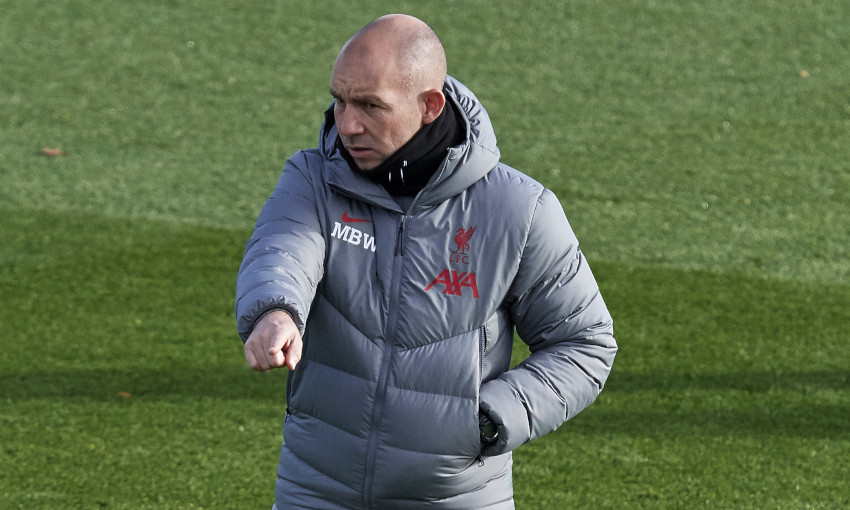Behind the Badge: Creating 'moments of change' with LFC U18s
Marc Bridge-Wilkinson is always looking for the 'moment of change'.
In the Academy environment at Liverpool FC, where individual development is cherished more than results on the pitch, it’s a click.
It’s clear, visible evidence of a player turning hours of tutelage, dedication and practice behind the scenes in Kirkby into reality during a match.
And it’s the No.1 source of job satisfaction for U18s boss Bridge-Wilkinson.
“On the pitch you’re looking for performance,” he begins to tell Liverpoolfc.com after a pause to carefully consider the question of his daily aims.
“We’re looking to try to see elite behaviours in terms of the performances on the pitch but also their attitude and their character on it and around it.
“It’s great when you sit back at the end of a day and you see that a boy has taken on board a piece of information.
“It might not be that you’ve given it that day, it might be something you’ve been working on for a period of time. But there are times when you see that there’s a change in mindset, there’s a change in the way they think, there’s a change in the way they adjust to the moment in the game, where they’ve shown the ability to learn and take the information on board, they’ve shown the ability to actually go and have a go, whether it works or it doesn’t work.
“But in that moment they’ve shown the fact they’re willing to listen, they’re willing to learn and they’re willing to have a go.
“And those moments can be quite special because that’s a moment of change. And when boys are willing to be open and they’re willing to change and they’re willing to take on board information, then they’re going to improve.
“As a development coach in an academy setting, those moments are quite special.”
Bridge-Wilkinson has had plenty to be satisfied about during his first season at the helm of the Reds’ U18s group, which represents his sixth overall with the club.
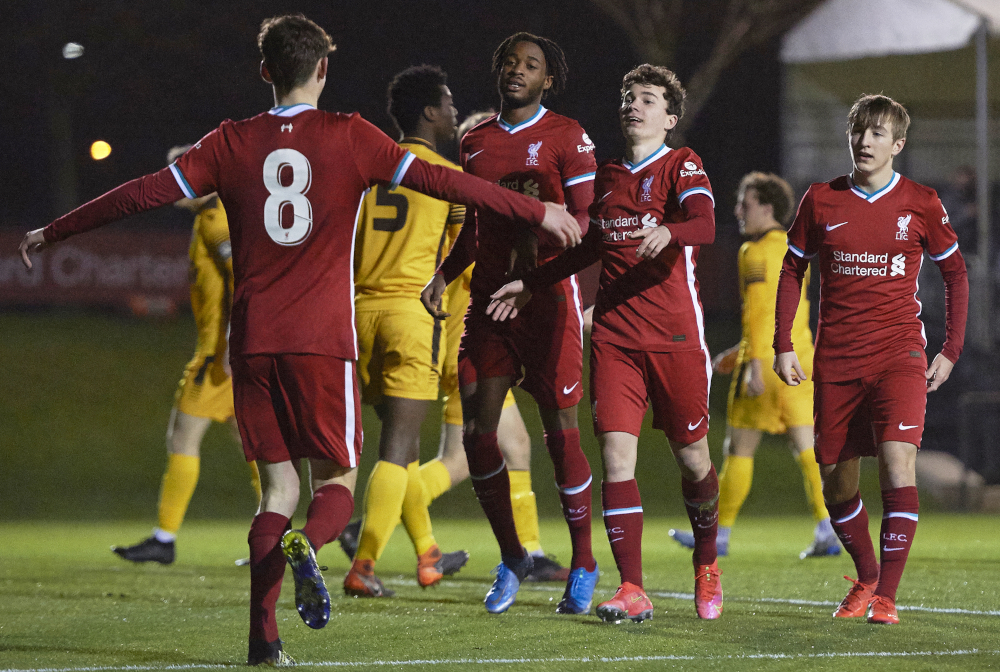
The team sit third in their division having scored at a rate of almost three goals per game in 2020-21, and have a mouth-watering FA Youth Cup fourth-round tie against Manchester United to tackle next month.
More important, however, has been the progress of players through and up the age groups – a process that recently saw a dozen youngsters from the Academy train alongside the first team, for example.
“It has been pleasing,” Bridge-Wilkinson said of the campaign. “We have had lots of good performances, obviously individually and as a group as well.
“We’ve got boys that are playing in the U23s, which is fantastic. They have earned the opportunity and the challenge to go and showcase themselves at the next level. Let’s hope that carries on.
“Then we’ve had boys that have come in and their pathway is a little bit different, so they have maybe not started as many games but now they’re starting to get into the team and get opportunities and they’re now starting to showcase themselves as a footballer. So, I think it has gone quite well.
“There has been lots of development, there has been lots of individual success in terms of performances in games, but obviously in training as well. Fingers crossed, that keeps going and the boys keep improving.”
Bridge-Wilkinson’s coaching career ran largely in tandem with his playing days.
As a child, he aspired to become a professional footballer, a mission he accomplished by representing Derby County – for whom his single appearance came as a substitute in a 2-1 win at Anfield in November 1998 – Port Vale, Stockport County, Bradford City, Carlisle United and Darlington.
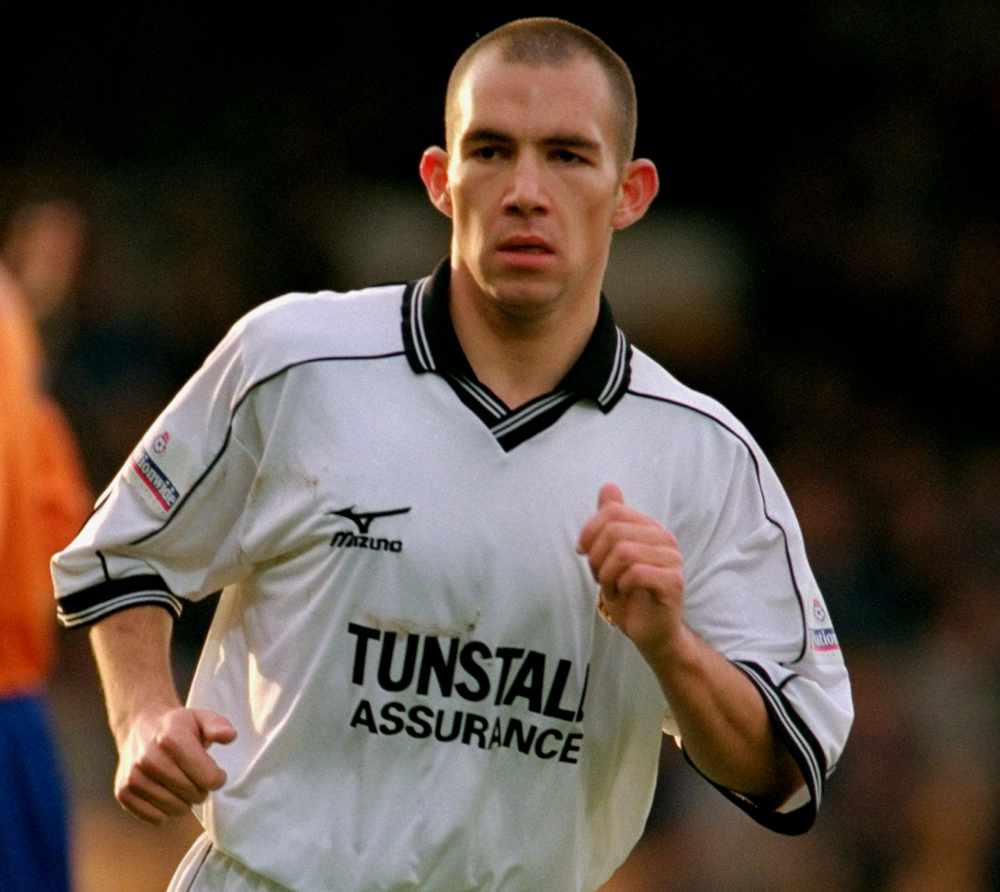
But his burning ambitions also stretched beyond a playing career.
Bridge-Wilkinson the young man knew he wanted to be a coach one day, too, and so began to walk a road that has brought him to his role with Liverpool.
“It was something I wanted to do very early on,” he explains. “Even at sort of 19, 20 I was already thinking about firstly how I could improve my game as a player, but also the areas of the game where maybe I could teach myself tactically.
“It has always been in the background, even when I was playing.”
At 22, the midfielder undertook a degree in sports exercise and coaching science at Manchester Metropolitan University.
With two sets of evening classes per week added to his full-time playing and training duties, the course understandably pushed Bridge-Wilkinson’s schedule to the limit.
He therefore opted to complete the qualification at a more gradual pace via distanced learning during subsequent years, while also gaining his UEFA B licence, priming himself for a transition that would come in 2012.
With his own boots hung up, the Englishman stepped into the coaching realm at Huddersfield Town’s academy for three years.
And then a proposition came from Merseyside.
“I had a phone call off Nick Marshall, who works in the Academy, basically saying there was a position available and was it something I’d be interested in?” he recalls.
“Obviously when you have a phone call like that you quite quickly go, ‘Yes, it’s Liverpool, of course I’m interested!’
“And then it just went from there really. I went and met Alex [Inglethorpe] and had a conversation with Alex. I obviously spoke with Nick. And, fortunately, I was offered the role. It was quite quick, it happened quite quickly but I was obviously very, very grateful for that opportunity.”
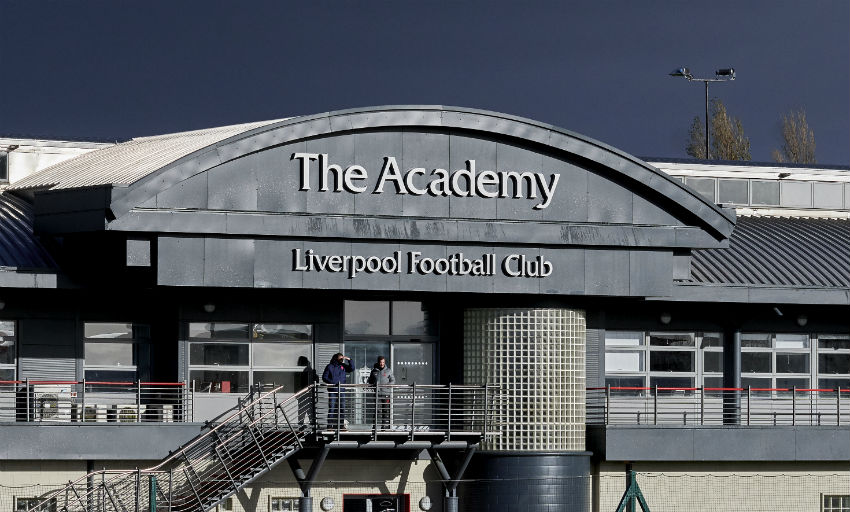
Bridge-Wilkinson started life with the Reds by overseeing the U14s, before a series of promotions that have seen him follow in the footsteps of Barry Lewtas, the current U23s coach.
“I’ve been very fortunate,” the 42-year-old notes, modestly, of his ascendancy to working with the U15s, then U16s and now U18s. “I’m very grateful for all of those opportunities.
“It wasn’t something I was looking to do straight away, I was happy coaching the U14s and then the U15s and then the U16s, but when the opportunity comes it’s something that, in time, you hope you’ll get to work your way up a little bit.”
That purposely designed pathway for coaches as well as players in Kirkby – one also recently travelled by Neil Critchley, who had spells in charge of the U18s and U23s before taking up the first-team post at Blackpool – formed part of the appeal when Bridge-Wilkinson joined the club.
On a practical level, it also means he has been working closely with some of the prospects under his guidance over multiple years, sharing a common history that he feels can be harnessed to the benefit of all.
“There are different ways of looking at it,” says Marc. “Obviously sometimes you can bounce from one coach to another and that can be really good, some individuals that might work for. Then there’s the longer relationships that are built over a longer period of time that can work just as well.
“The groups I’ve got now, both the first years and the second years, I know them both really well. I’ve worked with the second years now, this will be the fourth season out of five; and the first-year group this will be the third season on the bounce. So, yeah, I do know them quite well, which I think helps.
“It definitely helps in terms of your relationship – you’re not trying to build trust. Hopefully they trust me, hopefully they understand that what we’re doing is for them and that we’re trying to help them improve and give them opportunities to get better.
“It gives you a position where you start a little bit further along the line. Coming back into a season where you have got the same group, they know you. They know how you work, they know the type of standards that you demand or the type of style we would want them to play with. And that’s a shared thing through the Academy, of course, but it does have subtle differences from coach to coach. It definitely helps in that respect.”
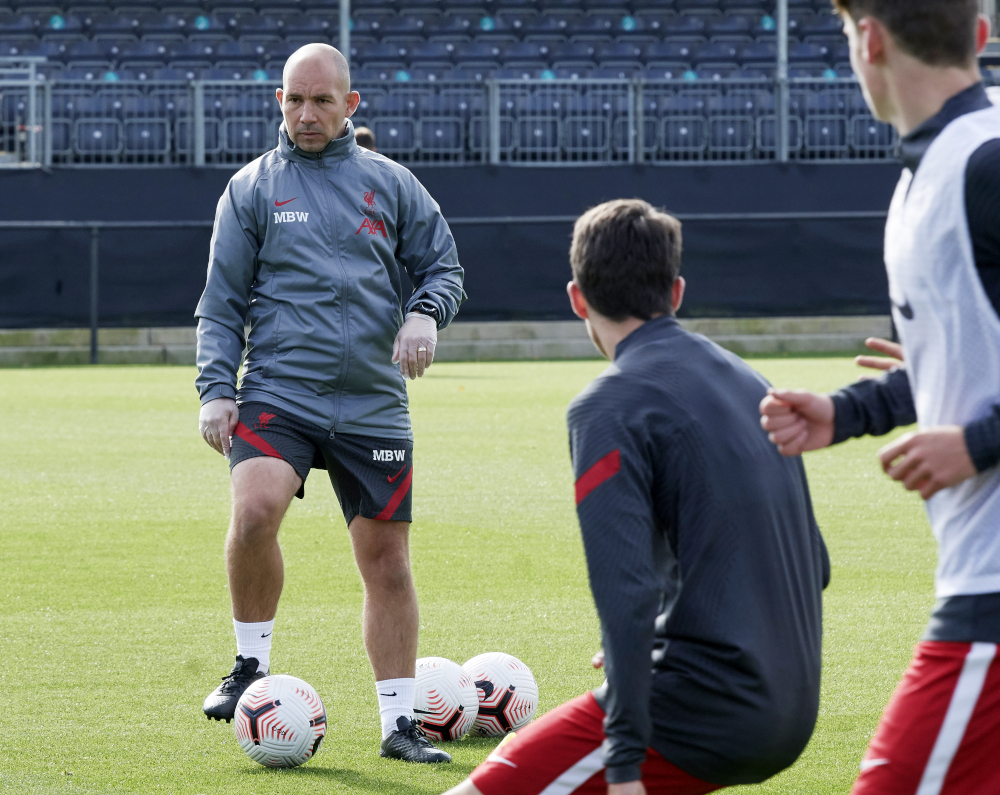
Bridge-Wilkinson, like each of his fellow managers and developers at youth level, has his own tactical preferences, preferred patterns of play and decision-making strategies.
So, how are they balanced alongside the wider football ideas embedded throughout the Academy?
“The easiest way to put it is that Alex and the people at the club have set out this philosophy of developing through the Academy, which is brilliant,” he details. “And I’d like to think perhaps that was the reason why I was recruited – because my ideas are very similar.
“I would imagine the majority of the coaches within the building, there’ll be differences of course, but have all got similar viewpoints on development, similar viewpoints on the game and what’s needed for young players to develop into, hopefully, Champions League football players.
“And although we have this big, shared idea and philosophy, each individual brings something slightly different. So yeah, I think it is shared but there will be small details that maybe one coach might think slightly differently.
“But the broader overview will be quite similar in terms of most of the coaches, if not all of them.”
There is no ‘typical day’ for Bridge-Wilkinson. “There’s lots going on,” he describes it. “And there’s lots going on all the time.”
The squad’s training sessions, gym work and matchdays take shape around their educational commitments on Mondays, Thursdays and Fridays.
A multitude of planning by Marc and his staff colleagues is, naturally, required to adapt and deliver that rhythmic schedule on the grass, with everything they do under continual review for potential improvement.
One-to-one feedback take place with players as required – ‘little reminders’, conversations and messages designed to aid progress in specific areas earmarked for development.
The essence of all that work can be distilled into a single sentence. “The goals, quite simply, are to help the players improve,” states Bridge-Wilkinson.
He continues: “To make sure players are being pushed and tested. And to make sure we’re giving them every opportunity to get better. That takes its form on the pitch obviously in technical drills, tactical little things or in games – that’s the big one obviously.
“But it also takes place off the pitch around developing standards and making sure the boys understand the responsibility they’ve got to the badge and to the crest they’re wearing. Because they are in such a fortunate position, like we are as staff, to be wearing the Liverpool crest that we have to make sure we’re doing everything in our power to keep that.
“It’s a big responsibility and part of them growing up is to understand that they have a responsibility to the club to make sure they are doing everything in their power to make sure they do well and they try to do well and they try to improve.”
A measured approach is vital, he insists, even in the case of a 94th-minute winner in a Merseyside derby.
When Bridge-Wilkinson’s side responded to conceding a late equaliser to Everton at the Academy last month by grabbing a memorable 2-1 victory through Mateusz Musialowski in stoppage time, the sense of occasion was met by proportional celebrations.
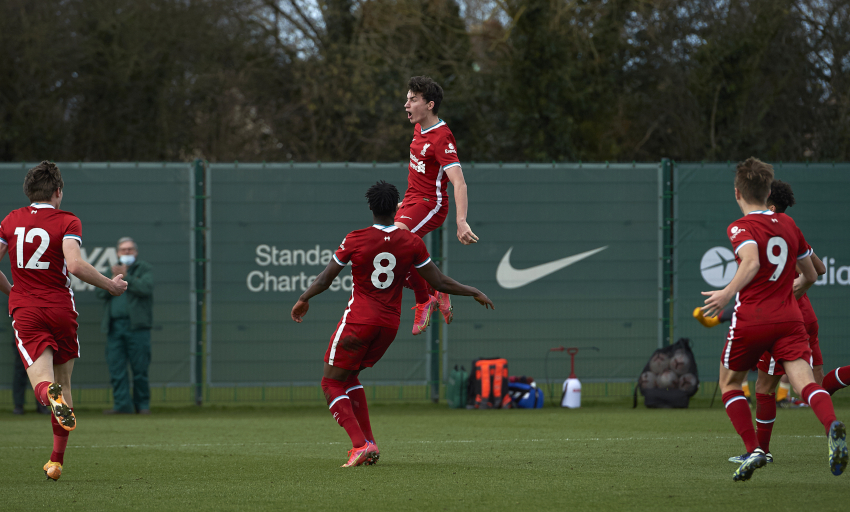
But there would be no opportunity to rest on laurels.
“You can’t take those things out of football because it’s important,” reflected the boss. “It’s ultimately where they’re going to end up. If they end up playing in that game as a first-team player, it’s about winning and losing.
“It was nice to get the last-minute winner. It was disappointing to concede the one two minutes before. It was a strange game, to be honest, because we came off on the back of quite a high, scoring the last-minute winner and everything seems great, but obviously when the emotion settles down the job then is to break it down and try to see where we can help the individuals again.
“It’s nice that they got that moment, it’s nice that they got the opportunity to enjoy it, but what’s really important is that we were back to work Monday morning and we move on.”
So, did the analysis focus more on the winner or the concession?
“Again, it’s down to teaching them the game of football,” Marc replies. “So every goal that is conceded in the majority of games, you could break it down and say there’s a mistake here, there’s a mistake there. Football is a game of mistakes.
“So it’s not always about highlighting where there’s an error or what’s gone wrong. It’s also about highlighting good performance, elite performance, elite behaviours.
“Our kind of role is to give them a diet of both. ‘Yes, this is something we can improve on, this is something that realistically we want to get better at. We’re aware of that. But actually, this is something you do really well. So look at the position, look at the situation you’ve got yourself into, look at how you’ve found yourself getting out of this situation.’
“So, yes, we’ll highlight areas where we can improve, of course, but also we’ve got to highlight areas of elite performance and highlight areas where boys are succeeding and boys are doing things that are very, very good.
“It’s just got to be a balanced view. We can’t give them everything that’s brilliant because that’s not real – we can’t just say, ‘Oh you were great, this was brilliant, we scored a last-minute winner and everything was great.’
“But likewise, if we were to lose the game it can’t be all negative. So we’d like to think – along with Jenks [Tim Jenkins, U18 individual coach/head of analysis], who works really closely with me, and Jenks is brilliant on all the analysis side of it – we give them a really balanced view. ‘These are things that we do well, these are areas where we can do a little bit better.’
“Then from there, we start saying, ‘Look, how can we do better? This is an individual thing and a collective thing. How can we do better? What can we do? Let’s think about how we do that or this? Likewise, this has gone really well – how can we do this more often? How can we get into a position where you can showcase this ability or this part of your game more?’
“It’s got to be balanced, it can’t be just related to the emotion of the game, not yet anyway.”
More from our Behind the Badge series
- From full-back to mentor - Rob Jones' Liverpool FC story
- The fanatical Red who discovered Trent Alexander-Arnold
- Basketball, teaching and becoming Academy jack of all trades
Bridge-Wilkinson knows his responsibilities aren’t limited to football.
The Academy is dedicated to developing well-rounded, qualified young people capable of building a prosperous career and life, whether they make the professional grade or ultimately take a different path.
Marc cites that aspect of the work done in Kirkby as ‘huge’ and knows its deep significance from personal experience during his own playing days.
“We want boys to go and play in our first team, we want boys to play in the Champions League, the Premier League and win trophies for our first team. That’s the big thing, of course,” he says.
“But we want boys that are able to deal with whatever comes their way, we want boys that are resilient, we want boys that can adapt to different situations, that they are able to take responsibility.
“And in doing all these things, and hopefully the culture that we have enables them to do it, if they do become a Champions League football player they are able to cope with the demands of that. They are able to cope with the demands of being a Premier League player, a Champions League player and potentially an international player.
“And, likewise, if they don’t quite make that grade, that they are capable of dealing with playing in the Championship or League 1 or League 2 or playing abroad. And, again, further down the line some might fade away a little bit and play non-league or whatever it is.
“So we’ve got to make sure, yes, we’re trying to produce football players but we’re also, really importantly, trying to produce good people that are capable of dealing with whichever situation comes their way later down the line.
“If you’re lucky enough to be a Premier League football player for 15 years or 10 years, there’ll be money involved, there’ll be TV interviews involved, there’ll be all sorts involved. And the boys have got to be able to cope with these different situations.
“Likewise, they might have to go and get a job interview somewhere. If they’re lucky enough to play football for 15 years, if you play at the lower levels you don’t retire with millions in the bank – you still have to get a job, similar to me. So you have to be able to go into interviews or you have to be able to talk to people, you have to be able to converse and to listen and be bright enough to showcase yourself in those situations.
“It’s really, really important for every aspect of development that we help the boys off the pitch as well.”


